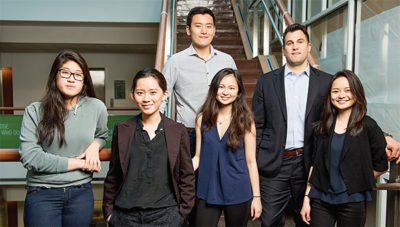The client was half a world away. The stakeholders had complicated demands. Cultural obstacles needed to be overcome. And the goals were constantly evolving.

Photo: Webb Chappell
Members of the Zoomcar MCFE team, front row from left: Gianca Devina ’19, Waree Rungsiriwat ’18, Theresia Susanto ’18, and Josephine Boenawan ’18. Back row from left, Bradley Qian ’18 and Jon Burton, MBA’17 (who oversaw the group).
In other words, it was just like real life. But when students sign on for a Management Consulting Field Experience (MCFE) project, that’s exactly what they’re seeking.
In a typical MCFE, students work with an organization to solve problems and offer advice. Clients receive free consulting services, and students get hands-on experience in a real-world setting.
This MCFE focused on Zoomcar in Bengaluru, India, a car-rental service that allows customers to rent cars for as little as an hour and up to several days. Co-founded in 2013 by American Greg Moran, Zoomcar also lets people register their new cars with the company and then rent the vehicles to earn money. The company has developed several proprietary technologies that help make car-sharing secure and feasible. Moran saw Zoomcar as not only an entrepreneurial opportunity but also a way of providing more efficient and greener transportation in congested India.
The Zoomcar MCFE was the first to work with The Lewis Institute in alignment with the United Nations Sustainable Development Goals (SDGs), a “plan of action for the planet” that calls for peace, human rights, and sustainable development. Carol Atwood, an entrepreneur in residence with The Lewis Institute, says the aim for such MCFEs is to help point businesses toward these goals.
But MCFEs frequently present unanticipated challenges, and this one was no exception. Despite the project’s emphasis on SDGs, the students’ research revealed that sustainability is not a top factor for Indian consumers when making purchases, says team member Waree Rungsiriwat ’18.
However, that didn’t mean sustainability couldn’t play a role in Zoomcar’s growth, says Bradley Qian ’18, who also worked on the project. The team determined that, because some aspects of Zoomcar’s business are inherently sustainable, simply improving the company’s bottom line supports sustainability as well. So over the course of the semester, the MCFE’s emphasis shifted to generating new revenue streams for Zoomcar. “Changing the focus was a little confusing at first,” Qian says, “but I definitely think that profitability and sustainability are intertwined.”
In May, the students—Qian, Rungsiriwat, Josephine Boenawan ’18, Theresia Susanto ’18, and Gianca Devina ’19—gathered in a video conference room to make their presentation to Moran and other stakeholders. Among the recommendations: partnering with India’s tourism industry; launching a line of package lockers that use Zoomcar’s keyless entry technology; and creating a “360 customer experience,” with destination-based recommendations for dining and sightseeing.
Moran praised the students’ work, remarking on the breadth and depth of their analysis. “They were able to come up with relevant ideas,” he says.
“It was a challenging project that was sometimes overwhelming for the students,” says Jon Burton, MBA’17, who oversaw the group. “But it was also exciting.”
Pairing MCFEs with companies driven by social innovation is a learning curve, says Atwood, but The Lewis Institute hopes to facilitate such partnerships going forward. Atwood also believes unforeseen challenges add value to a project. “I think some of the angst the students felt, with the dual mission of the SDGs and Zoomcar, was a healthy ambiguity,” she says. “This is what real work life is like.”—Jane Dornbusch
